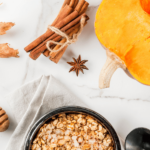When winter sets in, there’s nothing quite like cozying up under a blanket with a steaming mug of hot cocoa while the snow falls outside (or rain, if you’re in the winterless state of Florida). As the colder air bites, and the holiday season approaches, the cravings for comfort foods grow stronger—creamy mashed potatoes, slow-cooked stews, or freshly baked cookies that fill the kitchen with warmth. These foods not only keep us warm physically but also bring a sense of nostalgia and joy. You might think these treats are the main culprits behind winter weight, but there are more factors at play than you realize. Curious why winter makes us crave comfort foods and how to keep those extra pounds at bay? Keep reading for our best tips on keeping the winter weight off!
Why Do Some People Gain Weight in Winter?
It’s not just the festive feasts or your favorite comfort foods calling your name in the winter months. There are several reasons why colder weather can spark cravings and lead to weight gain.
1. Colder Temperatures Are Believed To Increase Hunger
Our bodies are naturally wired to maintain a steady temperature, so when it’s cold outside, your body has to work harder to stay warm. This can increase calorie-burning which might sound like a positive, but this process actually triggers hunger signals, leading you to crave high-calorie foods that provide warmth and energy, like those rich stews or other carb-heavy dishes. Historically, our ancestors needed extra calories in colder months for survival, and though we don’t rely on this as much today, our bodies haven’t completely let go of those patterns.
Tip: Plan your Meals
If winter is affecting your appetite, the easiest way to combat this is to pay attention to what you eat. While carbs may have that comforting factor, proteins will keep you fuller for longer and are often the healthier choice. This isn’t to say that you can’t have a scoop of mashed potatoes or your other favorite carb, just that you should make sure to do so in moderation. The typical recommendation for carb intake is a quarter of your plate at meals which can be enough to give you that comforting feeling when you pair it with a quarter of a plate of protein and half a plate of vegetables.
Learn How To Count Macros To Support Your Satiety
2. Seasonal Affective Disorder (SAD) and Low Mood
The shorter days and lack of sunlight in winter can affect our mood and energy levels, which in turn influences our appetite. Many people experience mild to severe cases of seasonal affective disorder (SAD), which can lead to an increase in comfort eating (1). Carbohydrate-rich foods, in particular, can boost serotonin levels and offer a temporary mood boost, making them especially tempting when feeling down.
Tip: Make Choices To Improve Your Mood
Increase Sunlight Exposure
If you’ve got a case of the winter blues, you might benefit from an increase in light exposure. This can mean bundling up to go outside or bringing the light inside with a lamp that mimics natural sunlight. The reason these steps can help improve mood is that sunlight triggers the release of serotonin, a neurotransmitter associated with happiness (2).
Stay Active
Exercise can be another great way to keep away SAD (seasonal affective disorder) and burn calories in the process. Exercise has been found to boost mood and can be especially beneficial for individuals with mild to moderate depression. Therefore, exercising regularly may increase feelings of well being, burn fat, and decrease the desire to binge on unhealthy snacks and comfort food. Now, that’s a win-win!
Try Supplements
Certain vitamins and herbs can help to improve mood. For example, individuals with vitamin B deficiencies often experience and improvement in their mood after they start supplementation. Additionally, the herb Ashwagandha has been shown to be beneficial for managing depression and anxiety, and causes an increase in serotonin levels (3).
Find Your Calm And Enhance Your Sleep With Ashwagandha
3. Holiday Celebrations
Winter brings holiday festivities, which often revolve around food. Thanksgiving, Christmas, Hanukkah, Kwanzaa, and New Year’s all come with indulgent meals, family gatherings, and celebrations filled with sweet treats and rich dishes. It’s easy to overeat during these times, especially when food is an integral part of socializing and celebrating.
Tip: Enjoy Festive Foods In Moderation
Sometimes completely passing up on a festive treat can leave you feeling down. The holiday season is filled with rich, tempting dishes, and there’s no need to skip them altogether. The key is moderation. Try mindful eating—enjoy the food, but pay attention to your hunger cues. Slow down, savor each bite, and stop eating when you’re satisfied, not stuffed. It’s perfectly fine to indulge, but keeping portion sizes in check can make all the difference in preventing excess weight gain.
If all your favorite foods are carb-heavy, you might want to consider using a carb blocker during the holidays. This type of supplement can help reduce the number of carbs that your body absorbs and can also support overall digestion. You can find out more about Research Verified Carb Blocker here.
4. Decreased Activity Levels
Colder weather can discourage outdoor activities and regular exercise, which are crucial for burning calories and maintaining weight. When combined with an increase in food intake, this lack of physical activity can contribute to winter weight gain. Even if you’re staying indoors more, it’s essential to stay active to balance out those extra holiday calories.
Tip: Stay Active, Even When It’s Cold
Cold weather might make outdoor activities less appealing, but staying active is crucial for managing your weight in the winter. If you don’t want to brave the cold, there are plenty of ways to stay active indoors. From home workout videos to yoga or bodyweight exercises, moving your body daily can help you burn calories and lift your mood. You can also embrace the outdoor activities that make winter fun, like skiing, snowshoeing, or even a brisk walk. Keeping up with regular exercise helps balance those extra winter calories and keeps you feeling energized.
5. Winter Affects Sleep Patterns
The shorter days and longer nights of winter can disrupt our natural sleep cycles, leading to poor sleep quality or more frequent disruptions. Reduced sunlight exposure can also interfere with melatonin production, the hormone responsible for regulating sleep. When we don’t get enough quality sleep, it can throw off the balance of hunger hormones, increasing ghrelin (which stimulates appetite) and decreasing leptin (which signals fullness). As a result, we may feel hungrier and crave more calorie-dense, sugary foods, making it easier to gain weight during the winter months.
Tip: Sleep Well To Support Your Appetite
Lack of sleep can mess with your appetite, making you crave more high-calorie, sugary foods. During the winter months, aim for 7-9 hours of sleep per night to help keep your hunger and cravings in check. Getting good sleep also supports your mood and energy levels, helping you stay on top of your fitness and nutrition goals.
Final Thoughts
While winter may bring cravings for comfort foods and a more sedentary lifestyle, being mindful of your choices can help you keep the extra pounds at bay. Pay attention to what you’re eating, keep moving, prioritize your mental health, enjoy festive treats in moderation, and try to maintain a normal sleep schedule. With small, consistent efforts, you can enjoy the cozy comforts of winter without the worry of winter weight gain.




Comments are closed.